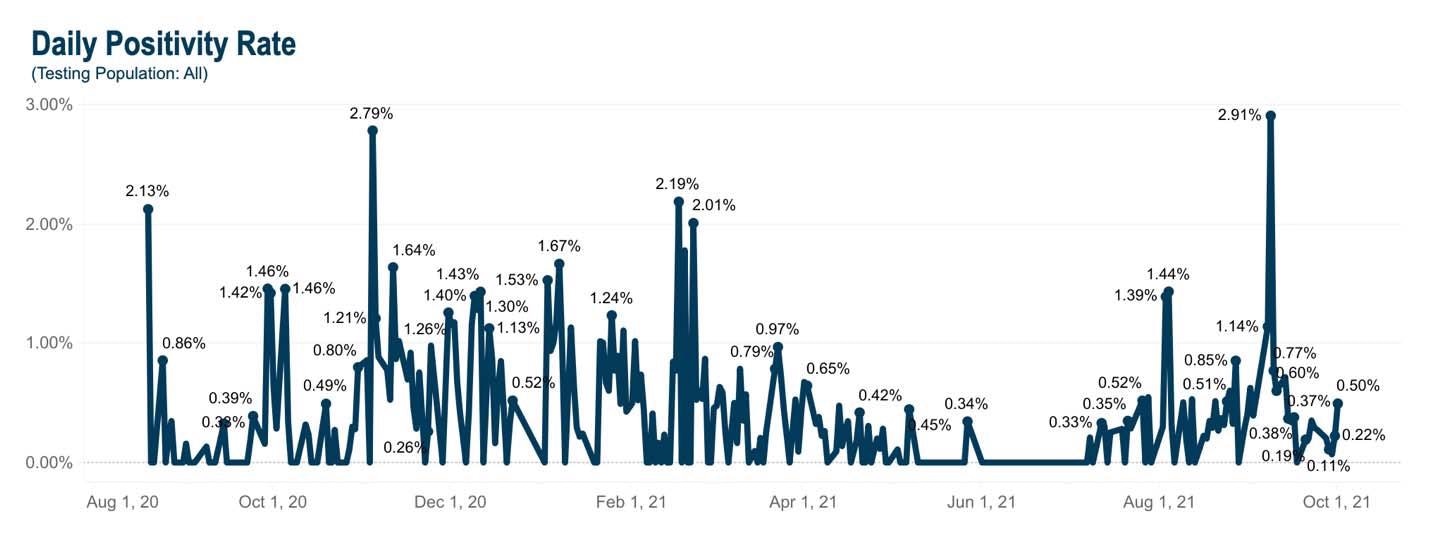The SPH faculty leaders collectively formed the CCST and provided epidemiological expertise and project management to work alongside the leadership of the local health department (LDOH). They updated the university administration on the real-time community efforts to mitigate the COVID-19 pandemic.
The CCST served as a ‘one-stop-shop’ to help the university students, staff, and faculty in accordance with the university’s COVID-19 policies. They served as an integral part of the university alongside student services and the newly designed public health laboratory (PHL) COVID-19 polymerase chain reaction (PCR) testing facility.
Case investigation, campus contact tracing, and epidemiological investigation by the CCST
When someone within the university community reported being positive for severe acute respiratory syndrome coronavirus 2 (SARS-CoV-2), the CCST called the individual and conducted an in-depth case investigation.
The gathered information regarding patient symptoms, food, transportation, medication needs, exacerbation (if any) in chronic health conditions, living situation (alone, with roommates), activities in the past five days and past two weeks to ascertain people in close contact and transmission possibilities. The CCST ensured confidentiality and saved all data in a secure RedCAP data portal. They assisted the individual during the 10-day isolation period and developed a follow-up schedule.
The CCST notified identified close contacts within 24 hours of the completed case investigation of their possible exposure. They instructed them to monitor their symptoms, obtain a PCR COVID-19 test at the PHL in three to five days or at the earliest, and provided university and COVID-19 informational resources.
The CCST reviewed all cases in real-time, using epidemiological tools. Moreover, they investigated potential outbreaks to set forth recommendations to mitigate SARS-CoV-2 transmission within the university campus. Through regular testing and an onsite PCR testing facility in conjunction with serial surveillance, the CCST kept a daily testing positivity rate below 3% and avoided shutdowns.
Initially, the CCST mandated PCR testing weekly for all university personnel but reduced it to once in two weeks after attaining a low-positivity testing outcome during a semester term. However, they exempted athletes who followed the National Collegiate Athletic Association (NCAA) established testing guidelines.
 Daily Positivity Rate for All University Personnel from August 2020 to October 2021
Daily Positivity Rate for All University Personnel from August 2020 to October 2021
COVID-19 Dashboard
The CCST provided aggregate and daily PCR testing numbers, results, and positivity rates for ~ 25,252 on-campus university members via an interactive, real-time, publically accessible dashboard, https://coronavirus.gwu.edu/. Here, they also updated who all needed regular testing as a condition of access to campus.
Quality Improvement
The CCST conducted a mid-year survey to obtain feedback on the CCST services. In December 2020, CCST designed the CCST Experience Survey wherein individuals who had tested COVID-19-positive and participated in a case investigation with the CCST completed an online survey anonymously and gave their feedback on the CCST services.
The continuous monitoring procedures determined that the CCST conducted all case investigations within the 24-hour window after being notified by the PHL lab. The CCST sent out university communications reinforcing behavioral viral mitigation measures before holiday breaks (e.g., Thanksgiving and Winter break) as people typically engage in social gatherings during holidays.
Study findings
Of the 75 survey respondents, 61% were students, and 58% were between 18 and 24 years. A majority of them, i.e., 63 of 75 respondents, were contacted by the LDOH within 4.02 days (average time).
The first ten questions enquired about the service quality and assessed responses on a five-point Likert scale. The mean response for the service quality items ranged from a low of 4.05 when asked about feeling less stressed after the CCST call to a high of 4.81 when asked if the CCST staff treated the respondent with respect.
Concerning the level of satisfaction with the CCST services, the mean response was 4.70. Likewise, the mean for satisfaction with the overall CCST experience was 4.63. Response to quality improvement and satisfaction for all items did not vary with respondent’s university affiliation, age, or gender.
Close to 24% of the respondents provided qualitative recommendations, asking for improvements in the number and frequency of calls received by the CCST. They also reported that the contact time was delayed by four days (on average) when contacted by the LDOH.
The qualitative remarks helped the CCST modify their procedures, making brief check-in calls around day seven after the initial case interview. Further, they changed the exit part of the case investigation to manage communication expectations.
Conclusions
To summarize, a functioning CCST led by public health faculty enabled the university to act promptly when COVID-19 cases were surging. They conducted the case investigation and contact tracing to monitor potential incidences of COVID-19 transmission, especially emphasizing on-campus situations and off-campus events.
The CCST timely notified and engaged positive cases in their care coordination. Likewise, they provided close contacts of COVID-19-positives with timely notifications to get on-demand COVID-19 testing. The capability to contact persons testing positive within 24 hours and immediately start the contact tracing process proved beneficial for the health and safety of everyone at the university.
Upon reopening, the university even mandated participation in regular COVID-19 surveillance and testing for the university personnel who gained access to campus.

 *Important notice: medRxiv publishes preliminary scientific reports that are not peer-reviewed and, therefore, should not be regarded as conclusive, guide clinical practice/health-related behavior, or treated as established information.
*Important notice: medRxiv publishes preliminary scientific reports that are not peer-reviewed and, therefore, should not be regarded as conclusive, guide clinical practice/health-related behavior, or treated as established information.